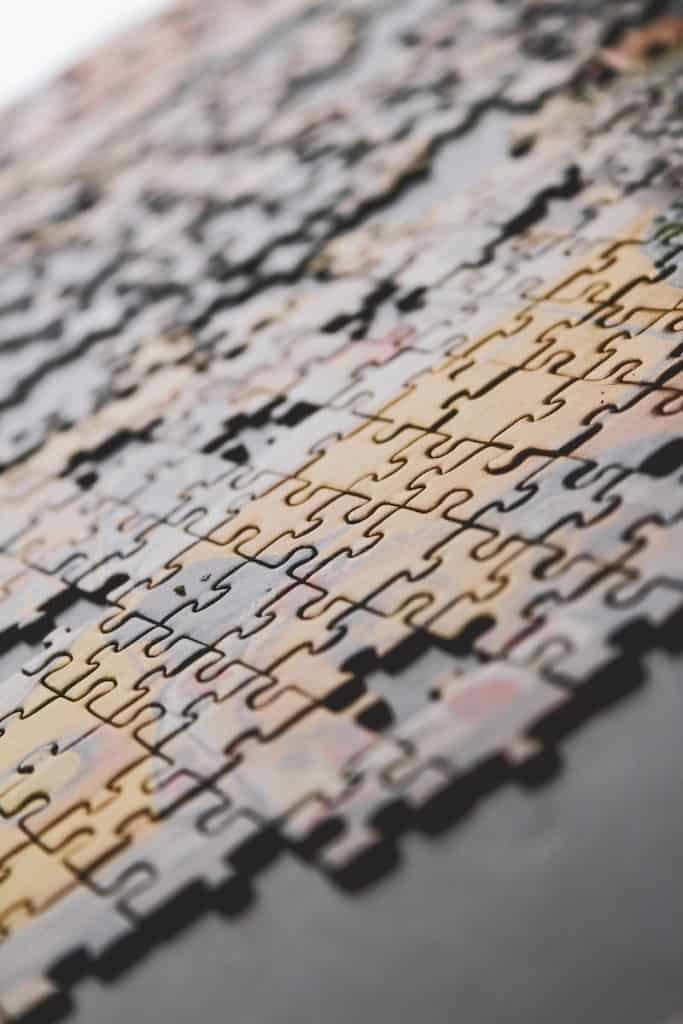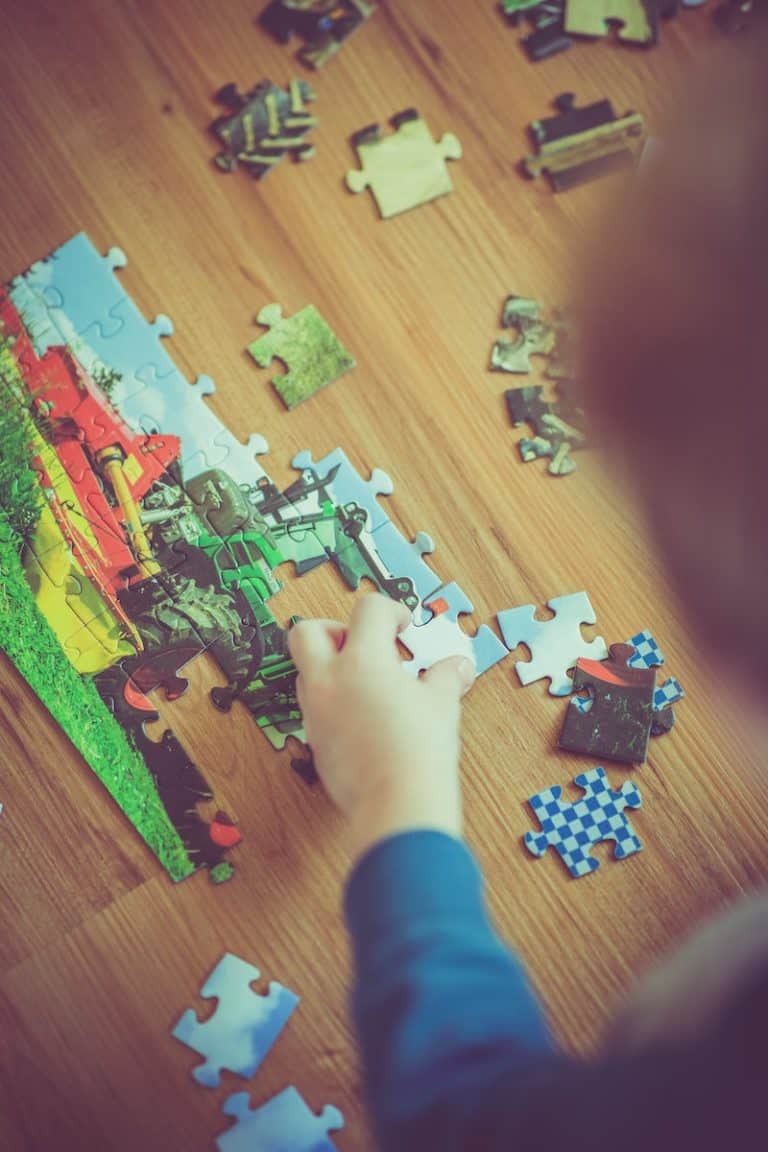Jigsaw puzzles are a terrific activity for all ages, from young children to adults. They come in an infinite variety of shapes, sizes and difficulty levels. But how do jigsaws help a child’s development?
Puzzles are key for toddlers’ development and an integral part of preschool and kindergarten. They help develop numerous skills, making them the perfect educational play activity during early childhood years.

How Do Jigsaws Help a Child’s Development?
There are many benefits to doing jigsaw puzzles in early childhood, including helping to develop fine motor skills and problem-solving abilities.
1. Relaxation
Lastly, puzzles are not only for kids- many adults enjoy them too because they’re easing and fun. They help reduce stress, encourage thoughtfulness, and can be used to calm a kid who’s feeling anxious. If you want to take a break from playing around actively, doing puzzles is perfect.
2. Fine Motor Skills
Puzzles are excellent for developing fine motor skills because children have to use their fingers in a precise way to manoeuvre the small pieces. As they join the pieces together, they develop muscle control and strength. It is important to select a puzzle that has piece sizes appropriate for the age and development of the child. Generally, younger children need puzzles with bigger pieces so that they can learn how to handle smaller ones effectively.
3. Gross Motor Skills
Large floor puzzles not only develop gross motor skills, but also stretching across the body to pick up a piece. This helps children learn to cross the midline, which is great for their development.
4. Perseverance
A child who completes their puzzle, no matter how long it takes them to concentrate, is developing perseverance and emotional skills. This skill will be useful in school and throughout their life after school.
5. Visual Perception
Children utilize their skill of visualization when they build puzzles; this is the ability to see images, shapes, and forms on pieces and understand how they all fit together cohesively. If children lacked this skill, it would be impossible for them to put puzzles together.
Not only is visual perception important for literacy and writing skills, but it’s also key for building puzzles. By working on a puzzle, children can develop several aspects of their visual perception, such as:
- Visual memory
- Visual discrimination
- Visual comprehension
- Perception of shapes
- Visual analysis and synthesis
- Visual closure
6. Eye-Hand Coordination
Not only does it develop visual skills, but hand eye coordination is the ability of the eyes and hands to work together seamlessly to carry out tasks – like catching a ball or tying shoelaces. A great way to enhance eye-hand coordination from an young age is by playing with puzzle pieces; it helps build a child’s visual-motor integration which is critical for learning how to write.
7. Early Maths
When solving puzzles, children not only have fun, but they are also inadvertently encourage children for success in geometry and math. This is because puzzle play helps kids to see patterns and shapes in both the individual pieces as well as the completed picture. Shape recognition is an important skill that lays a foundation for success in geometry, and understanding patterns is key to grasping nearly all mathematical concepts.
8. Spatial Relations
Developing spatial relations is understanding the positioning of objects in space, relative to other objects. This helps with literacy skills such as reading and writing, as well as numeracy skills like working with numbers and letters. It also shows how they are orientated.
9. Attention Span
If you have ever observed a child intently solving a jigsaw puzzle, you may have noticed they seem focused and engrossed in the activity. This is because puzzles are an excellent way to get children to concentrate without getting sidetracked. With enough practice, slowly a child can train themselves to keep their attention concentrated for more lengthy durations of time.
With other activities, a child may stop whenever they please. With puzzles, however, the child cannot complete the task until every piece is found. This creates motivation for a child to keep searching until the puzzle is solve, along with a sense of achievement when completed.
10. Problem-Solving
Children often become frustrated when building puzzles, but this is because they are challenging themselves and thinking hard. A puzzle is meant to be solved in a specific way, whether through logical reasoning, trial and error, or by matching colours, shapes or patterns. Children should have plenty of opportunities to practise their problem-solving skills during playtime.
11. Independent Play
Playing with puzzles encourages independent play, which is an important skill for children to learn. It helps them find ways to entertain themselves and enjoy some quiet time on their own. For additional strategies on enhancing independent play through puzzles, you might find jigsaw puzzle sorting trays helpful.
12. Cognitive Skills Development
Not only does building jigsaw puzzles have various benefits for cognitive development in early childhood, but the types of puzzles a child can do actually show their level of maturity. For example, whereas a toddler would primarily build a puzzle through trial and error, an older child would begin to match the pieces based on the picture. You can tell that your child is growing when they begin to attempt puzzles, as it requires a certain level of developmental understanding.
For more on how puzzles can aid in cognitive development, see jigsaw puzzles for critical thinking. Additionally, children at this stage may also start developing their own methods or systems—such as building the border first or sorting by like-pieces. Discover more on how to create a puzzle-solving space in your home to support their growing skills.
13. Confidence
Watching a child put together a puzzle and seeing the pride on their face is priceless. It’s not only a confidence booster for them, but it also gives them a sense of competence and achievement. If you want your child to enjoy puzzles, make sure to offer them age-appropriate options. The puzzle should be challenging but still possible for them to complete on their own.
A child who is struggling and battling with a puzzle will get frustrated and eventually give up. They will also be less likely to reach for a puzzle next time. For tips on selecting the right puzzles and ensuring they are enjoyable and suitable for your child’s developmental stage, check out jigsaw puzzle size considerations. Also, consider exploring jigsaw puzzle assembly parties to make puzzling a fun and social activity for children.
How Do Jigsaws Help a Child’s Development- Bottom Line
So, how do jigsaws help a child’s development? Aside from being entertaining, puzzles offer a range of benefits for children’s development. They encourage concentration, problem-solving skills, independent play, spatial awareness, cognitive growth, confidence, and perseverance. Puzzles can also be used as a relaxing activity for both kids and adults. Overall, it’s important to offer age-appropriate puzzles to ensure your child’s success and enjoyment.

